0
Brain Challenge v1.1.4 N-GAGE SymbianOS9.1 Cracked-BiNPDA
Posted by moodyels
on
11:03 AM
in
N.GAGE 2.0
Gameloft Brain Challenge v1.1.4.N-GAGE.SymbianOS9.1.Cracked-BiNPDAJoining the launch line-up of titles for the N-Gage Platform is Gameloft's Brain Challenge. While there will be a handful of ‘big' titles for the N-Gage, Brain Challenge is not one of them - but there's nothing wrong with that. While the flash titles make up the column inches, it's games like this that are going to be the bread and butter earners for Nokia and its partners. It would be mighty interesting to see just how well Brain Challenge does in the ‘revenue earned' column after three or four months. I would not be surprised to see this title become a solid and continuing revenue stream for the Finns. Nothing here is especially new, but it fits well into the genre of ‘play a little puzzle every day' that was started by Dr Kawashima's Brain Training on the Nintendo DS.
For those of you who aren't familiar with this, you play a series of mini-games each day, each lasting a few minutes at most. The scores for these games are combined to give you a ‘daily score' and this is compared to previous scores. If the theory of exercising your mental ability holds true, you should see a steady improvement. Rather than progress through a games storyline, you progress in yourself, creating a much better and more rounded person in the process.
Or you could argue that developers have found a way to write really simple games and package them up for profit, but only a cynic would think that....
Gameloft should be congratulated for some good presentation here - the games (12 in total, I believe) are grouped into the four areas they are testing, namely Maths (annoyingly labelled Math in my version...), Memory, Visual and Logic. The games are all controlled with the d-pad (and the occasional button press), so there are very few issues with the controls. Which is good - the point of these games is for you not to be thinking about what key to press next, but simply to think.
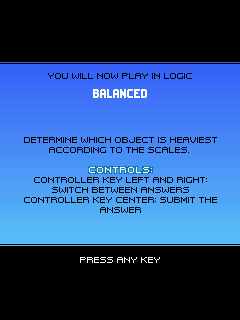
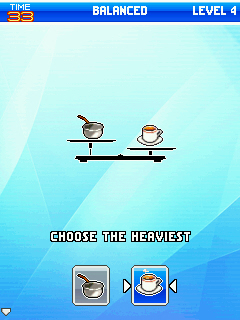
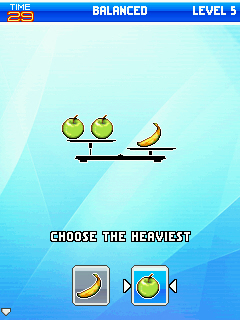
Two examples of the mini-games should make my point clear. The first is Balance, coming under the Logic section. You're presented with a set of scales and asked which item is heavier. Initially this is pretty easy - just go for the one which has dropped the scales. But as you progress through your 60 second game, and as you play it more and more often, you'll come across more difficult challenges, with multiple items on each side of the scales, or even scales on top of scales. Yet you're asked to work out which of two single items is heavier with a flick to left or right of the cursor. Fun indeed... well it is to me.
Trout, under the Maths section, is another example of something that looks simple, and is... if you ignored the timer. Given a grid of numbers, a start point, and then a mathematical operator (e.g. ‘+4') you have to jump from your target square (say it has 17 in it) to the square that is next in order... i.e. 17+4=21. So jump left, right, up or down to the square with 21 in it; then 25; then 29... Make five jumps and you get a new grid and new modifier. Much like Balance, and many of the other games, it's a basic task, but when put under pressure to do as many as you can against the clock, that's when it gets interesting.
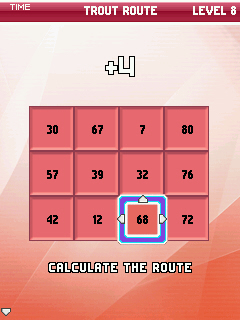
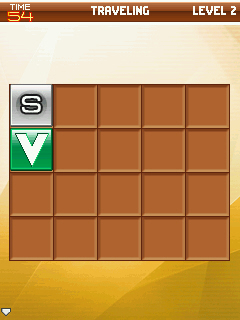
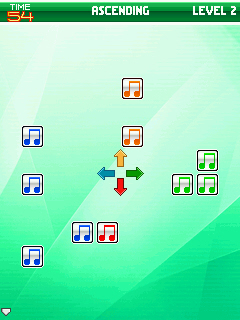
There's nothing especially new in this mix, nor are the games amazingly 'out there' - we're talking basic pattern recognition in many of the games, some quick mental mathematics and some cunning psychological tricks when you're counting (such as four red number threes), but the games are clear, surprisingly fun, and, by limiting each game to a time limit of 60 seconds, stay fresh and challenging over the time you'll be playing the game - and as you play, you'll unlock more of the mini-games.
While the idea of a learning curve goes somewhat against the grain of the daily brain game genre, Gameloft's unlocking strategy keeps the title from going stale. Coupled with the ten minutes a day nature of the game, I think Brain Challenge is going to do very well.
TesTed By Me

For those of you who aren't familiar with this, you play a series of mini-games each day, each lasting a few minutes at most. The scores for these games are combined to give you a ‘daily score' and this is compared to previous scores. If the theory of exercising your mental ability holds true, you should see a steady improvement. Rather than progress through a games storyline, you progress in yourself, creating a much better and more rounded person in the process.
Or you could argue that developers have found a way to write really simple games and package them up for profit, but only a cynic would think that....
Gameloft should be congratulated for some good presentation here - the games (12 in total, I believe) are grouped into the four areas they are testing, namely Maths (annoyingly labelled Math in my version...), Memory, Visual and Logic. The games are all controlled with the d-pad (and the occasional button press), so there are very few issues with the controls. Which is good - the point of these games is for you not to be thinking about what key to press next, but simply to think.



Two examples of the mini-games should make my point clear. The first is Balance, coming under the Logic section. You're presented with a set of scales and asked which item is heavier. Initially this is pretty easy - just go for the one which has dropped the scales. But as you progress through your 60 second game, and as you play it more and more often, you'll come across more difficult challenges, with multiple items on each side of the scales, or even scales on top of scales. Yet you're asked to work out which of two single items is heavier with a flick to left or right of the cursor. Fun indeed... well it is to me.
Trout, under the Maths section, is another example of something that looks simple, and is... if you ignored the timer. Given a grid of numbers, a start point, and then a mathematical operator (e.g. ‘+4') you have to jump from your target square (say it has 17 in it) to the square that is next in order... i.e. 17+4=21. So jump left, right, up or down to the square with 21 in it; then 25; then 29... Make five jumps and you get a new grid and new modifier. Much like Balance, and many of the other games, it's a basic task, but when put under pressure to do as many as you can against the clock, that's when it gets interesting.



There's nothing especially new in this mix, nor are the games amazingly 'out there' - we're talking basic pattern recognition in many of the games, some quick mental mathematics and some cunning psychological tricks when you're counting (such as four red number threes), but the games are clear, surprisingly fun, and, by limiting each game to a time limit of 60 seconds, stay fresh and challenging over the time you'll be playing the game - and as you play, you'll unlock more of the mini-games.
While the idea of a learning curve goes somewhat against the grain of the daily brain game genre, Gameloft's unlocking strategy keeps the title from going stale. Coupled with the ten minutes a day nature of the game, I think Brain Challenge is going to do very well.
TesTed By Me




